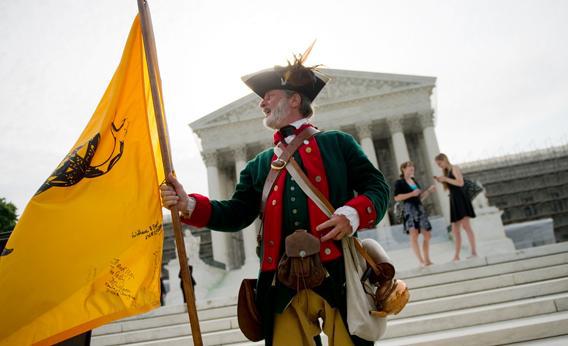President Obama demanded and received the resignation of the acting commissioner of the IRS on Wednesday. The agency gave special scrutiny to conservative groups applying for 501(c)(4) status, which is reserved for “social welfare” organizations. Many Explainer readers have asked the obvious question: What social welfare functions do Tea Party groups perform?
They educate you on the dangers of big government. In its application for 501(c)(4) status, Karl Rove’s Crossroads GPS claimed it would spend 20 percent of its resources on research, 30 percent to influence policy, and 50 percent on educating the public on such issues as the national debt, health care, and pension reform. The conservative Center for Individual Freedom told the IRS its education efforts would focus on “promoting individual freedom and constitutional protection.” Liberal 501(c)(4)s also claim to be primarily educational. America’s Families First, for example, claims to educate the public on “creating jobs for the middle class” and “improving public education.”
Public education, even regarding political issues, constitutes social welfare as the IRS understands the term. The agency doesn’t require 501(c)(4) groups to hold bake sales for the school marching band or walks for cancer research. Those sorts of activities are undertaken by charities, which typically organize under 501(c)(3) of the Internal Revenue Code. By the agency’s own admission, social welfare is a “very broad category,” and it undoubtedly includes issue advocacy. In the IRS’s view, pro-choice and anti-abortion groups are both working to improve public welfare.
The challenge is determining when public education efforts become electioneering, which is not considered social welfare work and can constitute only a minor portion of a 501(c)(4) group’s activities. The IRS has a multi-prong test, including such factors as whether the advocacy occurs close to an election, whether an advertisement mentions a candidate by name, and whether the group has a long-standing position on an issue. (Christian churches, which are typically 501(c)(3) organizations and barred from political advocacy, are allowed to engage in anti-abortion campaigning, for example, because their opposition didn’t emerge simply for purposes of defeating individual political candidates.)
Although this so-called “facts and circumstances” test is murky, most tax experts think it would be workable if the IRS had the resources to enforce it. In practice, political 501(c)(4) groups on both sides of the ideological divide flagrantly violate the anti-electioneering rule, and the IRS only rarely responds. Just before the 2010 election, for example, Crossroads GPS ran a television advertisement accusing Pennsylvania Rep. Joe Sestak of voting to “gut Medicare” and “raise taxes over $5 billion.” During the same election season, the left-leaning Women’s Voices Women Vote Action Fund ran an ad claiming that Colorado Senate candidate Ken Buck “refused to prosecute an admitted rapist” as district attorney. Political 501(c)(4) groups claim that such advertisements constitute social welfare work rather than campaigning because they don’t explicitly call on viewers to vote a certain way. That’s why so many recent ads have ended with statements like “Tell Ken Buck Colorado women deserve respect” rather than “vote against Ken Buck.”
Got a question about today’s news? Ask the Explainer.
Explainer thanks Donald Tobin of the Ohio State University Moritz College of Law.
